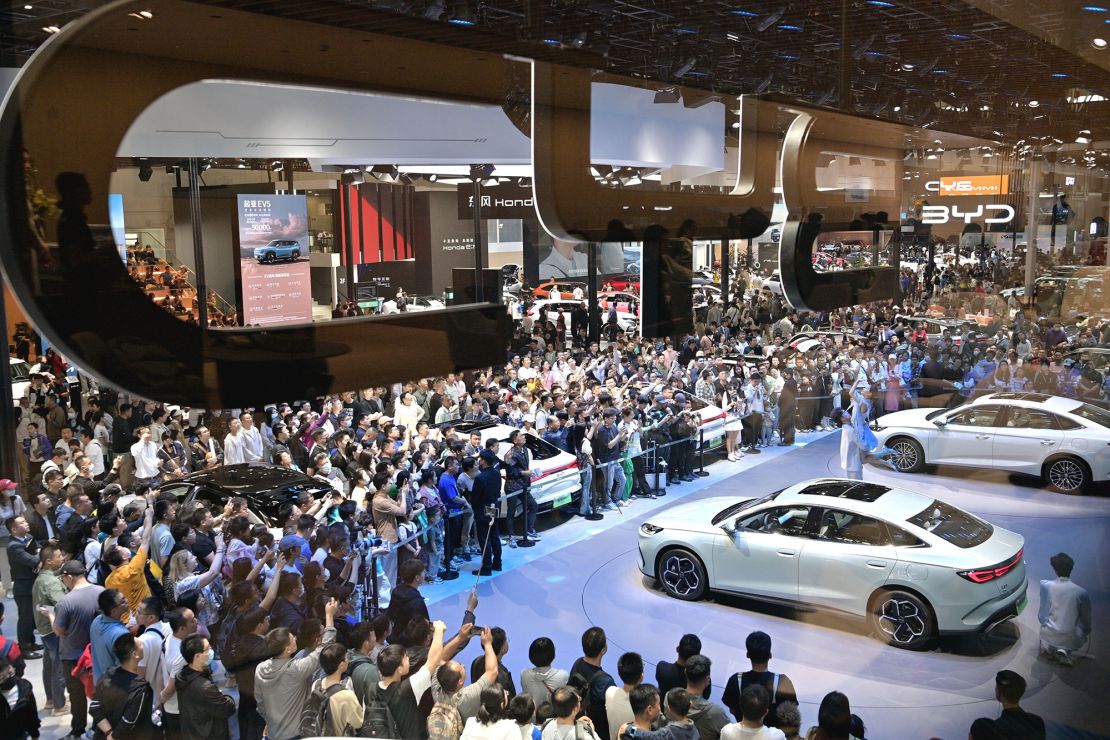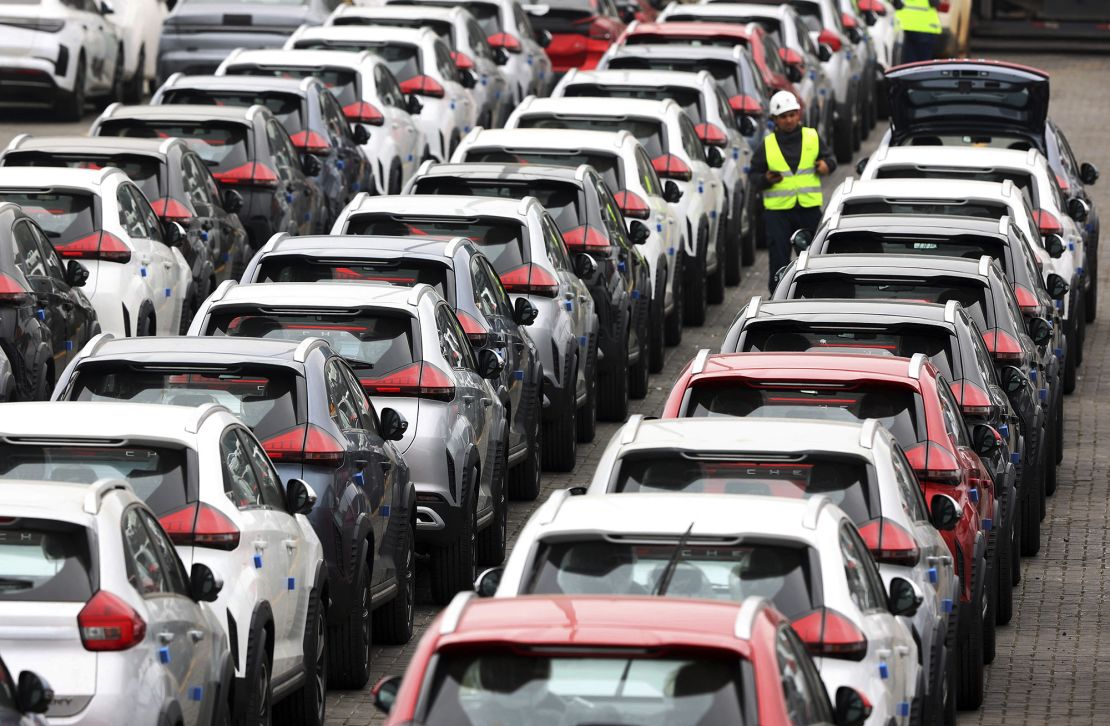the EV situation- Elon Musk..
"Then, say analysts, Tesla ( TSLA) arrived. In December 2019, the first China-made Tesla Model 3
rolled off a production line in Shanghai and everything changed".
The ‘glory days’ for global automakers in China are over
Analysis by Hanna Ziady, CNN
September 3, 2024

People pose with XPeng's new Mona M03 electric vehicle at its launch in Beijing on August 27, 2024.
Pedro Pardo/AFP/Getty Images
LondonCNN —
Foreign automakers have dominated China’s car market for decades, selling millions of vehicles and raking in enormous profits. That golden era is now coming to an abrupt end.
The rapid rise of China’s homegrown electric vehicle (EV) makers, such as BYD and Xpeng ( XPEV), is upending the largest passenger car market on the planet and leaving the world’s biggest carmakers on the losing end.
The latest sign of the steep challenges facing traditional automakers came Monday, when Volkswagen warned it could close plants in Germany for the first time in its history, in an effort to cut costs.
The German car giant has seen its deliveries in China, its single largest market, tumble by more than a quarter from just three years ago to 1.34 million in the first half of this year. And last year, the company lost its crown as China’s biggest-selling car brand to BYD, sheddinga title it had held since at least 2000.
But Volkswagen, the world’s second-largest carmaker after Toyota ( TM), is not the only company in trouble. Ford ( F) and General Motors ( GM) are also among firms seeing sales and market share vanish in China as local consumers spurn overseas brands to buy Chinese instead.
In July, foreign carmakers’ share of auto sales in China slipped to 33% from 53% in the same month two years earlier, according to data from the China Passenger Car Association (CPCA).
Automakers’ profits in China are coming under pressure too. In the quarter ended June 30, income from Toyota’s Chinese joint ventures plummeted 73% compared with a year earlier, according to financial statements.
Worse still, GM’s joint ventures in China (it has 10 in the country) reported consecutive quarterly losses this year. The American automaker’s sales in China have halved from a peak of above 4 million in 2017 to 2.1 million last year.

“Very few people are making money (in China),” its CEO Mary Barra told analysts on a recent earnings call. “It’s unsustainable because the amount of companies losing money there cannot continue indefinitely. And really, when you get into the type of pricing war that’s going on now, it’s really a race to the bottom.”
China’s brutal and prolonged EV price war has already claimed several local carmakers. Foreign automakers have also had to restructure their businesses or shut down once-sprawling operations in the country.
In October, Japan’s Mitsubishi Motors announced it would end production of its cars at its joint venture in China, following years of declining sales. Honda ( HMC), Hyundai, and Ford have also taken drastic steps, including layoffs and factory closures, to cut costs, according to stock exchange filings and state media reports.
“The glory days of … enjoying high rates of growth and huge profits (in China) are over,” said Michael Dunne, an auto industry veteran and the CEO of Dunne Insights, a consultancy focused on EVs.
“If you’re a mass-market brand in China, your days are numbered.”
The Tesla ‘miracle’
For global automakers, the sudden change in fortunes follows some two decades of uninterrupted growth in sales and profits in China, beginning in the early 2000s. Volkswagen and GM, which began operations in the country many years earlier, have enjoyed an even longer run of financial rewards.
So strong was the sense that the good times would never end that, according to Dunne, one auto executive quipped: “We make more money than God here.”
Even after the Chinese government began pouring money into local EV and battery manufacturers in the mid-2010s, under leader Xi Jinping’s “ Made in China 2025” strategy, foreign automakers continued to grow market share. Chinese consumers still preferred conventional cars from well-established brands.
Then, say analysts, Tesla ( TSLA) arrived. In December 2019, the first China-made Tesla Model 3 rolled off a production line in Shanghai and everything changed.
“Overnight, it’s as if a miracle occurred,” said Dunne, describing it as a “monumental” turning point. “Tesla’s manufacturing of the Model 3 in Shanghai transformed consumers’ perspective of electric cars.” They became “the new cool,” he added.
A Tesla Model 3 at a delivery ceremony in Tesla's Shanghai factoryon December 30, 2019.
Yilei Sun/Reuters
Tesla had a “halo effect”on Chinese EV makers, such as BYD, Neo, and Li Auto, according to Dunne, which had been steadily improving their electric cars over several years and were ready to capitalize on the sudden spike in demand.
The International Energy Agency predicts that sales of battery electric and plug-in hybrid vehicles in China will hit 10 million this year accounting for almost half of car sales in the country up from just 1.1 million four years ago.
Generational shifts have also helped Chinese brands.
“In the 1990s and 2000s, it was the parents that bought a lot of the cars and (they) didn’t trust any of the Chinese brands,” said Tu Le, managing director at Sino Auto Insights, a consulting firm.
“The current market is their kids … they grew up buying things on Alibaba, buying things on JD.com, using WeChat, so the thought of buying a Chinese brand (doesn’t have) this negative connotation to it,” he told CNN.

Visitors crowd around BYD vehicles at the 2024 Beijing International Automotive Exhibition in May 2024.
Xinhua/Shutterstock
Established automakers were caught badly off guard by the abrupt shift to EVs in China. The timing only made things worse: Months after Tesla kickstarted demand for EVs, China went into a years-long coronavirus lockdown.
Auto executives couldn’t visit China every year to see what was happening for themselves, said Le.
When it finally dawned on them just how far behind their firms had fallen on everything from vehicle software and production speed to battery technology and control of supply chains crucial to making EVs, it was almost too late to recover the lost ground.
Last year, BYD sold a record 3.02 million vehicles globally, including plug-in hybrids, up 62% from 2022. By comparison, Volkswagen delivered 1.02 million electric and plug-in hybrid vehicles, up 26% on 2022. Meanwhile, Tesla, which makes only fully electric cars, sold 1.8 million.
“Global automakers were caught flat-footed on EVs, lulled into complacency by years of winning at selling gasoline-powered vehicles,” Dunne wrote in a recent newsletter.
“Almost every non-Chinese brand … is feeling shell-shocked as they watch their market shares disappear.”
The world’s new auto center
And China’s EV makers are not satisfied with success only at home.
The country’s passenger car exports are soaring: They jumped more than 60% last year compared with the previous year to top 4 million. By some measures, that made China the world’s largest car exporter, ahead of Japan and Germany. More than a quarter of those exports were electric, according to the CPCA.
By 2030, Chinese carmakers could see their share of the global EV market double to roughly a third, UBS has forecast, with European firms suffering the biggest loss of market share as a result.
The threat that poses to the storied auto industries of Europe and North America has triggered a wave of tariff hikes on China-made EVs. But it’s unclear whether higher import duties will be enough to stop the onslaught.

Chinese vehicle imports at the Port of San Antonio, Chile, in August 2024. Chinese cars account for 40% of the Chilean market.
Raul Bravo/AFP/Getty Images
Back in China — a market too big to leave altogether and fast becoming a global hub for making and exporting EVs — global automakers are leaning heavily into local partnerships.
Last year, Volkswagen bought a 5% stake in Xpeng for $700 million and agreed a strategic partnership to jointly develop vehicles as it attempts to reverse a decline in sales in China.
Months later, Stellantis ( STLA), which makes Citroen, Fiat, and Peugeot cars, bought a 20% stake in Chinese EV maker Leapmotor for about €1.5 billion ($1.7 billion).
Starting this month, Stellantis will begin selling Leapmotor vehicles in nine European countries, highlighting the growing clout of Chinese EV brands in overseas markets as well.
At the same time, Chinese carmakers are rapidly growing their global footprints, with BYD planning plants in Thailand and Hungary, among other countries. The company is also buying its German distributor Hedin Electric, as it moves to scale up in Europe, according to a statement Friday.
“The new center of the world’s automotive industry is China,” said Dunne.
“Everybody is still trying to come to terms with: where to (go) from here? How do we compete with the Chinese?”
edition.cnn.com |




